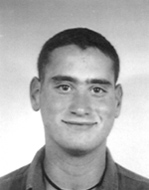Son of Ruti and Shlomo. He was born on June 26, 1975, at the Hadassah Hospital in Jerusalem, to a family of three. Yaniv completed his elementary studies at the “Arlosoroff” school and went on to the Gymnasium in Rehavia, where he could not integrate and moved from one school to another. Yaniv had a sharp intellect and an extraordinary perception, but was not motivated to learn. He grew up in a loving family and immediately received every wish he had raised. Was a very sensitive and self-confident boy, a born leader and very accepted in society. The life of his friends revolved around him and they willingly and lovingly accepted his decisions. Yaniv loved life and spent every spare moment, as if he knew there was not much time left. His parents say: “When we asked what would happen with the studies, Yaniv knew he would finish his studies after the army with honors, and Yaniv could no longer fulfill this promise.” At the end of November 1993, Yaniv was drafted into the army with the clear knowledge that he was going to one of the elite units, but Yaniv was assigned to combat engineering, a force that made his life miserable and after many mishaps with his commander he decided that only by desertion and military prison could he serve In an elite unit, he was imprisoned twice before being summoned to a special committee, and after proving his will and determination to serve in an elite unit, Yaniv was summoned again to the induction center and sent to a combat paramedics course. Yaniv was sent to the Hebron Brigade at the end of the course. Yaniv was Simcha to serve in this unit until on January 16, 1996, he was hit by the bullets of terrorists, which put an end to all his hopes and hopes of his family. Yaniv was brought to rest in the military cemetery on Mount Herzl in Jerusalem. He was twenty-one years old when he fell. He left behind his parents and two sisters – Tali and Anat. “I saw a purple flower, I saw a yellow flower and you were among them, among the flowers … No, I did not see you under the flowers, but right inside them, among them … Your job as a combat medic was so involved … I met you for the first time in November 1994. In the opening interview, you told me about your father, sisters and military history, which included many desertions and discipline problems, and I will not forget the answer to my question: ‘After such a past, why should I accept you for a course?’ You told me about unlimited willpower, you mentioned that you lost 47 kilograms of your weight in order to recruit you and ‘bought’ me when you said that your dream was to be a combat medic and that no obstacle would stop you. The vastness of the course (especially for a person without learning habits) made it difficult for you to see that despite your many attempts, you failed. At that time, we had many conversations, which I was well acquainted with: your kindness, your adult ability to distinguish between subtleties and above all, your ‘concepts of giving’, brought me much to you. I will not forget our long conversation before you left for another course. “The knowledge gaps that were created were too large and after deliberation, I decided to offer you two options: to continue the current course and sit for nights as a day to cover the gap, or to go down to another course that is in its early stages and to learn the second time. On Sunday, you returned to the base, with a slightly different statement: ‘I decided, after all, that I would learn the best thing again – it is our goal to be the best medic possible.’ With a warm handshake, I wished you success, and from your new commander and from you, I understood that you were ‘flowering’ and was Simcha about it. Graduated medics and I charge you to keep in touch and most importantly take care of yourself. We parted. I made sure to ask and find out how you function as a paramedic – and I was proud to hear many compliments.We met again a few weeks before the incident. I was at the end of rebuilding the paramedics course and you were in a ‘clinic-responsible course’. You told me about your experience as a combat medic and brought up a large number of subjects to be introduced into the new paramedics course. We promised to keep in touch. Again I asked: ‘Take care of yourself.’ I can not describe my feelings the moment I saw your picture in the newspaper – I read the article over and over, I can not believe you are not, I almost do not remember your funeral, I just remember the flowers – the yellow, the purple I do not believe in another world, but if it exists, you must have assumed the role of ‘helper,’ “the mediator,” the “counselor.” That is how I remember you. (This page is part of the Yizkor memorial project held by the Ministry of Defense)
